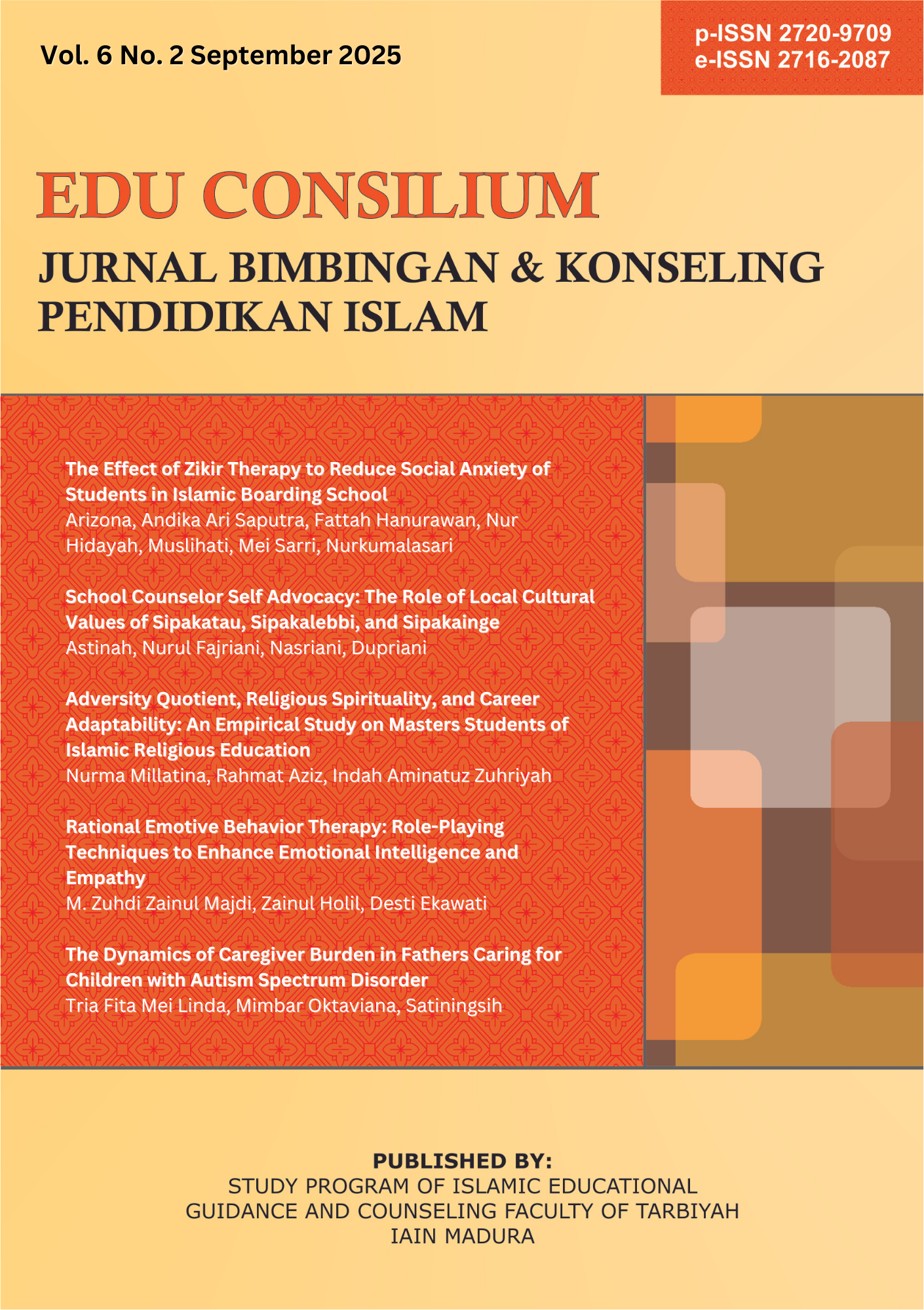The Effectiveness of Group Counseling with Behavioral Contract Technique to Reduce Online Game Addiction of Students at SMA Negeri 1 Wuryantoro
 Abstract views: 175
,
Abstract views: 175
,
 PDF downloads: 206
PDF downloads: 206
Abstract
This research was conducted at SMA Negeri 1 Wuryantoro with the intention of finding out how good the behavioral contract strategy is in group counseling to reduce student addiction to online games. Pre-experimental research utilizing the One Group Posttest-Posttest Design paradigm was carried out. In this study, data was taken using purposive sampling design. Sampling strategies that consider certain criteria in harmony with the study vision are known as purposive sampling. Subjects with a very high and high level of internet game addiction are the targets in this study, because the sample strategy is intended to be utilized. Researchers use a non-parametric analytical test approach, namely the Wilcoxon Signed Rank test, to evaluate the efficacy of the services offered. By utilizing the data in the table, it can be concluded that group counseling with behavioral contract techniques is effective in reducing online game addiction in SMAN 1 Wuryantoro students, considering the z-calculation score of -2.021 and the significance value of 0.028 (<0.05). Therefore, we can test the hypothesis that online game addiction can be reduced effectively through group counseling.
Downloads
References
Abdi, S., & Karneli, Y. (2020). Kecanduan Game online: Penanganannya dalam Konseling Individual. Guidance, 17(02), 9–20. https://doi.org/10.34005/guidance.v17i02.1166
Asri, A. R., Saman, A., & Umar, N. F. (2022). kecanduan Game online Siswa dan Penanganannya Pada Era Pandemi : Studi Kasus Siswa Sekolah. Pinisi Journal of Art, Humanity & Social Studies, 2(6), 190–200.
Azka, N., & Arliani, D. (2024). Penerapan Konseling Kelompok Untuk Mengurangi Kecanduan Game online Pada Siswa. Jurnal Ilmiah Mahasiswa, 2(1), 29–32.
Fajar, M.,dkk (2024). Kecanduan Game online pada Remaja. Journal of Education Research, 5(3), 3995–4001. https://doi.org/10.37985/jer.v5i3.1273
Kurnia, Y., dkk, (2024). Mereduksi kecanduan Game online Melalui Layanan Konseling Kelompok Dengan Teknik Behavior Contract. Consilia (Jurnal Ilmiah BK), 7(1), 21–27.
Latipun. (2015), Psikologi Konseling. Malang : UMM PRESS.2015
Lestari, M., dkk (2021). Efektivitas Layanan Konseling Kelompok Kontrak Perilaku Untuk Mengurangi Perilaku Bermain Game online di Rumah (Studi Eksperimen Kuasi Siswa Kelas VIII di SMP Negeri 15 Palu). Ristekdik : Jurnal Bimbingan Dan Konseling, 6, 202. https://doi.org/10.31604/ristekdik.2021.v6i2.202-212
Lio, S., dkk. (2022). Efektivitas Penerapan Teknik Behavioral Contract Melalui Bimbingan Kelompok untuk Mereduksi Kecanduan Game online Siswa. Jurnal Studia Insania, 10(2), 125–135. https://doi.org/10.18592/jsi.v10i2.8963
Marchasan, M. D. S., & Sari, R. O. (2023). Adiksi Game online Di Sma Negeri 1 Ciranjang. Jurnal Ilmiah Multidisiplin, 1(2), 238–241.
Nursyifa, F. I., Widianti, E., & Herliani, Y. K. (2020). Gangguan Tidur Mahasiswa Fakultas Keperawatan Universitas Padjajaran Yang Mengalami Kecanduan Game online. Jurnal Keperawatan, VIII(1), 32–41.
Noviasari, I. K., Affandi, G. R., & Ansyah, E. H. (2023). Pengaruh Layanan Konseling Dengan Teknik Behavior Contract Dalam Mengurangi Perilaku Menyontek Siswa Di Sma “X” Di Sidoarjo. Jurnal Mahasiswa BK An-Nur : Berbeda, Bermakna, Mulia, 9(3), 130. https://doi.org/10.31602/jmbkan.v9i3.12010
Prakarsari, L. T. (2024). Studi Literatur: Penerapan Konseling Kontrak Perilaku (Behavior Contract) Pada Siswa Sekolah Menengah. Jurnal Pembelajaran, Bimbingan, Dan …, 4(6), 6–10. https://doi.org/10.17977/um065.v3.i10.2024.11
Pratiwi, A., & Yusnaldi, E. (2022). Analisis Pengaruh Game online terhadap Kegiatan Sosial dan Minat Belajar Peserta Didik Madrasah Ibtidaiyah. Jurnal Basicedu, 6(3), 4524–4530. https://doi.org/10.31004/basicedu.v6i3.2867
Purba, A. D., & Nurhayani, N. (2024). Strategi Layanan Konseling Kelompok Pada Remaja Terhadap Pornografi. Academy of Education Journal, 15(2), 1210–1220. https://doi.org/10.47200/aoej.v15i2.2398
Rahma, N. . (2022). Pandemi Bawa Dampak Lain, Indonesia Jadi Negara Ke-3 Pemain Game online Terbanyak. https://wartaekonomi.co.id/read399041/pandemi-bawa-dampak-lain-indonesia-jadi-negara-ke-3-pemain-game-online-terbanyak
Rizai, M. (2021). Konseling Kelompok Dengan Teknik Biblioterapi Untuk Mengurangi Kecanduan Game online Pada Anak: Sebuah Kajian Literatur [Group Counseling With Bibliotherapy Techniques To Reduce Online Game Addiction in Children: a Literature Review]. Journal of Contemporary Islamic Counselling, 1(2), 101–114. https://doi.org/10.59027/jcic.v1i2.79
Satura, A., & Rifayani, H. (2024). Pengaruh Kecanduan Game online Terhadap Keterampilan Sosial Individu : Analisis Dampak dan Implikasi modern . Kemajuan teknologi , memudahkan akses ke game online melalui berbagai perangkat elektronik satu dampak kecanduan game online terhadap keterampila. Jurnal Publikasi Ilmu Psikologi, 2(1), 219–233.
Sugiyono. (2019). Metode Penelitian Kuantitatif, Kualitatif, dan R&D. Alfabeta.
Setiawan. (2018). Role Playing Game ( RPG ) Maker (software penampung kreatifitas, Inovasi dan imajinasi bagi game designer).Yogyakarta, CVANDIOFFSET
Yandri, H.,dkk. (2022). Kebermaknaan Konseling Kelompok dalam Menanggulangi Masalah Kehidupan. Indonesian Journal of Counseling and Development, 4(2), 59–69. https://doi.org/10.32939/ijcd.v4i2.1526
The journal operates an Open Access policy under a Creative Commons Non-Commercial 4.0 International license. Authors who publish with this journal agree to the following terms:
- Authors retain copyright and grant the journal right of first publication with the work simultaneously licensed under a
 Commons Attribution-NonCommercial 4.0 International License
Commons Attribution-NonCommercial 4.0 International Licensethat allows others to share — copy and redistribute the material in any medium or format, and adapt — remix, transform, and build upon the material.
- Authors are able to enter into separate, additional contractual arrangements for the non-exclusive distribution of the journal's published version of the work (e.g., post it to an institutional repository or publish it in a book), with an acknowledgement of its initial publication in this journal.
- Authors are permitted and encouraged to post their work online (e.g., in institutional repositories or on their website) prior to and during the submission process, as it can lead to productive exchanges, as well as earlier and greater citation of published work (see The Effect of Open Access).




















